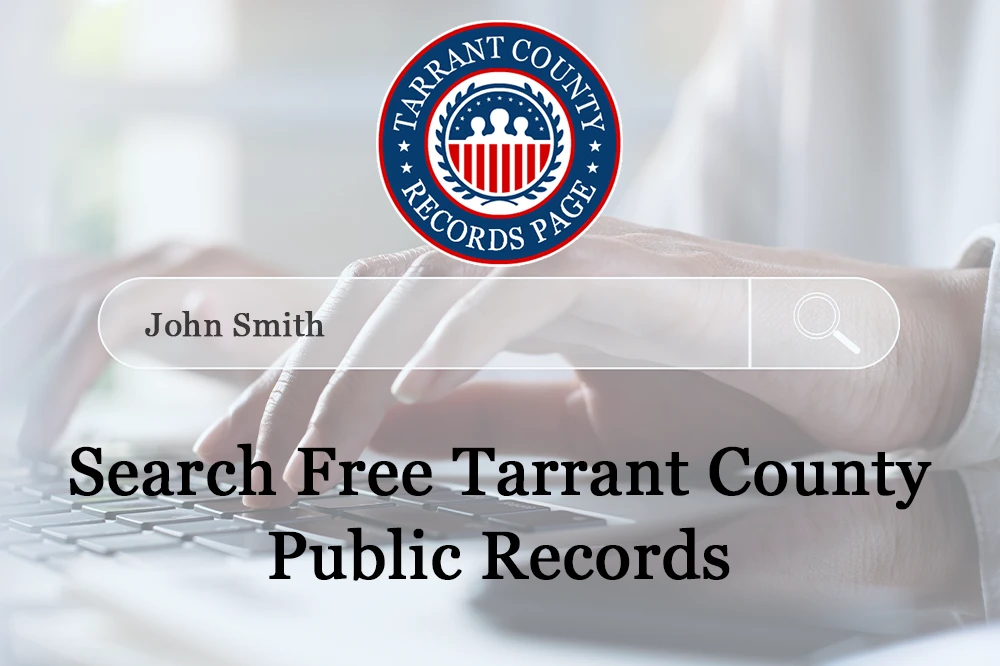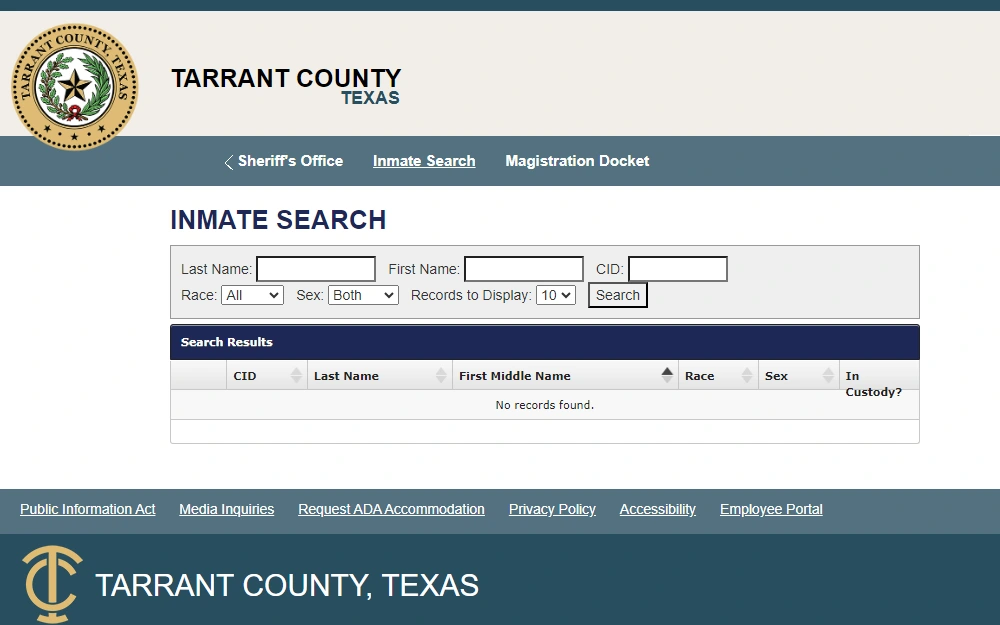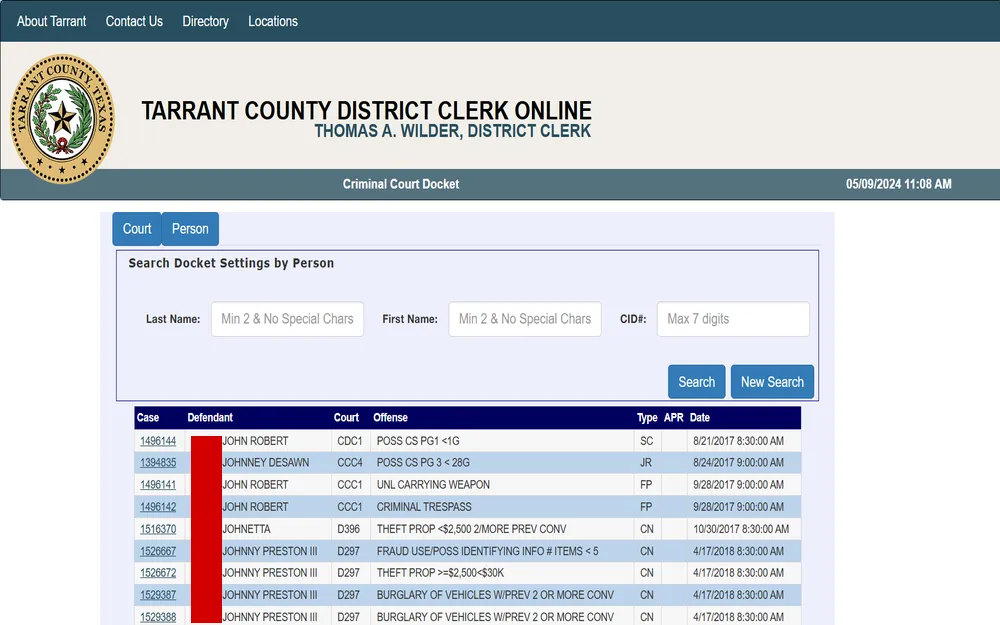Arrest Records For Tarrant County Texas: Your Ultimate Guide
Let’s face it, folks—curiosity can get the best of us sometimes. Whether you're looking into someone's past or just trying to stay informed, knowing how to access arrest records for Tarrant County Texas is a big deal. These records aren’t just about nosiness; they’re crucial for public safety, background checks, and even personal peace of mind. So, buckle up because we’re diving deep into everything you need to know about arrest records in this part of Texas.
Now, I get it—you might be wondering why anyone would care about arrest records. Well, here's the thing: these documents are more than just legal jargon. They provide insights into someone's history, which could be vital if you're hiring someone, entering into a relationship, or simply protecting your family. And hey, maybe you’re just curious about that neighbor who seems a little too mysterious. Either way, we’ve got you covered.
In today’s world, transparency matters. People want answers, and they want them fast. Whether you're using arrest records for professional reasons or personal curiosity, understanding how the system works in Tarrant County Texas can save you a lot of headaches. So, grab a cup of coffee, and let’s break it down step by step.
Read also:Columbine And Eric Harris A Deep Dive Into The Tragedy That Shook America
What Are Arrest Records and Why Do They Matter?
First things first, what exactly are arrest records? Simply put, they're official documents created when someone is arrested by law enforcement. These records contain a bunch of info, like the person’s name, date of birth, address, charges filed, and sometimes even mugshots. And trust me, this stuff isn’t just random data—it can have serious implications for both individuals and communities.
Arrest records matter because they help paint a picture of someone's legal history. For employers, landlords, and even potential partners, having access to this information can make all the difference. Plus, it’s not just about judgment—it’s about making informed decisions that protect yourself and those around you.
Understanding the Importance of Public Records
Public records, including arrest records, are an essential part of our legal system. They ensure accountability and transparency within law enforcement agencies. By making these records accessible, the public has the power to hold officials accountable and stay informed about criminal activity in their area.
Here’s the kicker: while some people might argue that public records invade privacy, the truth is they promote safety. Knowing what’s happening in your community can empower you to take action if needed. It’s like having a superpower to keep yourself and your loved ones safe.
How to Access Arrest Records in Tarrant County Texas
Alright, let’s talk logistics. If you want to dig into arrest records for Tarrant County Texas, there are several ways to do it. The easiest method? Head over to the official website of the Tarrant County Sheriff’s Office. Yep, you heard me right—it’s all online now, folks. No need to wait in long lines or deal with paperwork unless you absolutely have to.
But what if you prefer the old-school approach? Don’t worry; you can still visit the courthouse or contact local law enforcement directly. Just be prepared to bring some ID and maybe a small fee depending on the service you’re requesting. Either way, getting your hands on these records is easier than you think.
Read also:Broady Funeral Home Nashville Your Trusted Companion In Lifes Most Challenging Moments
Step-by-Step Guide to Finding Arrest Records
Let’s walk through the process:
- Visit the Tarrant County Sheriff’s Office website.
- Look for the “Criminal Records” or “Arrest Records” section.
- Fill out the required fields, like the person’s name and date of birth.
- Pay any applicable fees (usually around $10-$15).
- Review the results and download or print the records as needed.
Pro tip: If you’re searching for someone with a common name, narrow down your search by adding extra details like a middle initial or social security number (if allowed).
Key Details About Tarrant County Arrest Records
Before you dive headfirst into the world of arrest records, it’s important to know what you’re looking at. Tarrant County arrest records typically include:
- Name and aliases.
- Date of birth.
- Physical description (height, weight, hair color, etc.).
- Charges filed against the individual.
- Date and location of the arrest.
- Bond information (if applicable).
These details might seem overwhelming at first, but they’re all designed to give you a comprehensive view of the situation. Think of it like a puzzle where each piece helps you understand the bigger picture.
What Happens After an Arrest?
When someone gets arrested in Tarrant County Texas, the process follows a specific protocol. First, the person is taken to a booking facility where their information is recorded. Then, they may be held until a court appearance or released on bail. Throughout this process, every step is documented, creating the arrest record you can later access.
It’s worth noting that not all arrests result in convictions. Just because someone has an arrest record doesn’t necessarily mean they were found guilty. That’s why it’s always important to look at the full context before jumping to conclusions.
Legal Considerations and Privacy Concerns
Now, let’s address the elephant in the room: privacy. While arrest records are public information, there are limits to what can be disclosed. For example, sensitive details like medical conditions or family information are usually kept confidential. This balance between transparency and privacy is crucial for maintaining trust in the system.
Additionally, individuals have the right to dispute inaccurate information in their arrest records. If you believe a record contains errors, you can file a request for correction with the appropriate authorities. It’s your legal right to ensure the information is accurate and fair.
Protecting Your Rights as a Citizen
As a citizen, you have the power to advocate for yourself and others when it comes to public records. Whether you’re checking someone else’s background or ensuring your own records are correct, staying informed is key. Remember, knowledge is power—and in this case, it’s also protection.
Common Misconceptions About Arrest Records
There’s a lot of misinformation floating around about arrest records, so let’s clear up a few things:
- Arrest records are NOT the same as criminal convictions. An arrest doesn’t automatically mean guilt.
- Not all arrests result in charges being filed. Sometimes cases are dismissed or dropped entirely.
- You don’t need to be a lawyer to access public records. Anyone can do it with the right resources.
By understanding these distinctions, you can approach arrest records with a clearer mindset and avoid jumping to conclusions based on incomplete information.
Debunking Myths About Public Records
One common myth is that arrest records are automatically sealed after a certain period. In reality, most records remain public unless specifically expunged or sealed by a judge. Another misconception is that only law enforcement can view these documents. Wrong again! As long as you follow the proper procedures, anyone can access arrest records for Tarrant County Texas.
Data and Statistics on Arrests in Tarrant County
Let’s talk numbers. According to recent data from the Tarrant County Sheriff’s Office, arrests in the county have been steadily decreasing over the past few years. While this is great news for public safety, it also means that access to accurate records is more important than ever. With fewer arrests, each record carries more weight in terms of its impact on individuals and communities.
Here are some quick stats:
- In 2022, Tarrant County reported approximately 25,000 arrests.
- Drug-related offenses accounted for nearly 30% of all arrests.
- Domestic violence cases made up about 15% of the total.
These numbers highlight the importance of staying informed and understanding the trends shaping our community.
Why Trends Matter in Public Safety
Tracking arrest trends isn’t just about collecting data—it’s about improving public safety. By analyzing patterns and identifying areas of concern, law enforcement agencies can allocate resources more effectively. For citizens, understanding these trends can help you make smarter decisions about where you live, work, and spend your time.
Tools and Resources for Searching Arrest Records
So, you’re ready to start searching for arrest records. Great! Here are a few tools and resources to help you along the way:
- Tarrant County Sheriff’s Office website.
- State of Texas public records portal.
- Third-party background check services (use cautiously).
Remember, while third-party services can be convenient, they often charge higher fees and may not always provide the most up-to-date information. Stick with official sources whenever possible to ensure accuracy.
Which Tool Should You Use?
Choosing the right tool depends on your specific needs. If you’re conducting a casual search, the Tarrant County Sheriff’s Office website is probably your best bet. For more in-depth research, consider using the state portal or consulting with a legal professional. Whatever route you choose, always verify the information against multiple sources to ensure its reliability.
Kesimpulan
And there you have it, folks—a comprehensive guide to arrest records for Tarrant County Texas. Whether you’re investigating a potential employee, checking out a new neighbor, or simply satisfying your curiosity, understanding how to access and interpret these records is invaluable.
Here’s a quick recap:
- Arrest records are public information and can be accessed online or in person.
- They contain detailed information about arrests, charges, and other legal details.
- Always verify the accuracy of the records and consider the full context before drawing conclusions.
Now, here’s the fun part: take action! Leave a comment below sharing your thoughts or questions. Or, if you found this article helpful, share it with someone who might benefit from the information. Together, we can build a safer, more informed community—one arrest record at a time.
Final Thoughts on Public Records
Public records are more than just paperwork—they’re a reflection of our society’s commitment to transparency and accountability. By embracing this knowledge and using it responsibly, we can create a better future for everyone. So, go ahead and start exploring. Who knows what you’ll discover?


